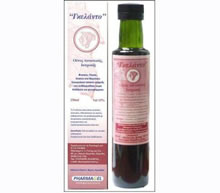
Λεξικό .. Bertholletia excelsa
Brazil nut (Bertholletia excelsa) of the Amazon region is consumed worldwide. It is rich in both monounsaturated fatty acids and polyunsaturated fatty acids and is known for its high selenium content. [1] . According to Strunz CC, et al (2008) the consumption of Brazil nuts for short duration by normolipidemic subjects in comparable amounts to those tested for other nuts did not alter serum lipid profile. The only alteration in HDL function was the increase in cholesteryl ester transfer. This latter finding may be beneficial because it would improve the nonatherogenic reverse cholesterol transport pathway[1].
Consumption of 2 Brazil nuts daily is as effective for increasing selenium status and enhancing GPx activity as 100 mug Se as selenomethionine. Inclusion of this high-selenium food in the diet could avoid the need for fortification or supplements to improve the selenium status in humans [2].
Undeclared Brazil nut residue in food products is of great concern because it can trigger life-threatening allergic reactions in sensitive patients. A rabbit polyclonal antibody-based competitive ELISA (IC(50) = 23.2 +/- 9 ng/mL, n = 76) with good sensitivity, detection range of 10-90 ng/mL, was developed. The ELISA could detect Brazil nut seed proteins over a pH range of 5-12. The optimal pH range for the detection assay was 7-10. Among the 66 tested foods/ingredients, only cinnamon exhibited statistically significant interference (1.36%, p = 0.05). Exposing Brazil nut seeds to processing did not adversely affect the nut seed protein detection using the assay. Brazil nut seed protein recovery from 100 mg of foods spiked with 10 and 1 microg of soluble Brazil nut proteins or 100 and 10 microg of defatted Brazil nut flour exhibited a wide recovery range, 63-315%, indicating protein-food matrix interaction[3].
References
1. Strunz CC, Oliveira TV, Vinagre JC, Lima A, Cozzolino S, Maranhão RC. Brazil nut ingestion increased plasma selenium but had minimal effects on lipids, apolipoproteins, and high-density lipoprotein function in human subjects. Nutr Res.2008 Mar;28(3):151-5.
2. Thomson CD, Chisholm A, McLachlan SK, Campbell JM. Brazil nuts: an effective way to improve selenium status. Am J Clin Nutr.2008 Feb;87(2):379-84.
3. Sharma GM, Roux KH, Sathe SK. A sensitive and robust competitive enzyme-linked immunosorbent assay for Brazil nut ( Bertholletia excelsa L.) detection. J Agric Food Chem.2009 Jan 28;57(2):769-76.
Γκέλης Ν.Δ. - Λεξικό Αλλεργίας - Εκδόσεις ΒΕΛΛΕΡOΦΟΝΤΗΣ - Κόρινθος 2013
Gelis Ν.D. - Dictionary of Allergies - VELLEROFONTIS Publications - Corinth 2013




